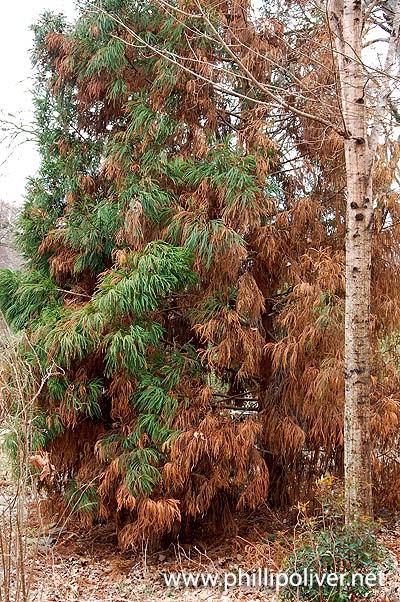But first, take a look at this gorgeous rainbow that we had on Friday!
The five-day stretch of warm temperatures last week really jump-started the garden. Now that plants are putting out new growth, it is easier to see what kind of damage the winter left. Back in mid-January, we experienced five straight days of below-freezing temperatures. This caused much damage in Portland and areas where frigid winds were a factor. Here, we were fortunate to not get the wind and the cold temperatures were dampened by a blanket of snow. That said, it was a tough time for the garden and there are noticeable casualties but no outright deaths that I have seen.
The bottlebrush (Callistemon 'Woodlander's Red') did not like the cold at all. It was planted six years ago, in the north-facing garden no less, and I've not experienced die-back on it until now. A local expert said to cut it all the way back so that is what I did. If it doesn't make it, I won't be too distraught. It is in a terrible location with little room to move and way too much shade.
 |
| The 4-foot bottlebrush reduced to ground level |
Another plant looking horrendous is the New Zealand Flax (Phormium). However, it appears none of them died outright. The question is how they will react to the pruning. In the past, I have only removed outer canes. A gardening expert from the UK, however, says cutting them back like this is perfectly fine. We shall see!
 |
| Unhappy Phormium |
Cutting the blades is no easy task. Even electric hedge trimmers are inadequate. I usually use regular pruning shears but this time, I used a Japanese knife that was a gift from friends, and it was fantastic. It made the job much easier.
After cutting back, you can see much green underneath -
When I looked at the Pineapple Guava last month, I thought that it looked good. However, time revealed many dead branches. I had no idea how to prune on of these and just trusted my instinct. Again, wait and see.
 |
Pineapple Guava - before
 | | After pruning |
|
I also thought the Parahebe, one of my favorite perennials, was toast but after cutting it back all the way to the ground, I see leaves. I never knew how to prune this and finally read on the Portland Nursery website that they should be cut completely back. The plant usually retains green leaves throughout the winter.
 |
| Parahebe before |
 |
| and after |
There was some really good news. Daphne 'Carol Mackie' looked awful a few weeks ago but look at her now -
 |
| Daphne 'Carol Mackie' - flush with new leaves |
Other jobs now include transplanting. The rose 'Michaelangelo' was beginning to get shaded by the Parrotia tree, so it has been moved to a sunnier spot. You know they always say to keep the rootball intact after digging it. In my experience, this rarely happens, especially with roses. However, this one was a success.
Poor Fuchsia 'Hawkshead' - this is the third move and I've yet to find a satisfactory spot. This time it is going on the northside of the house in the front garden. It is one tough plant. It grows differently from most fuchsias, very tall and upright.
Text and photos by Phillip Oliver, Dirt Therapy













Comments